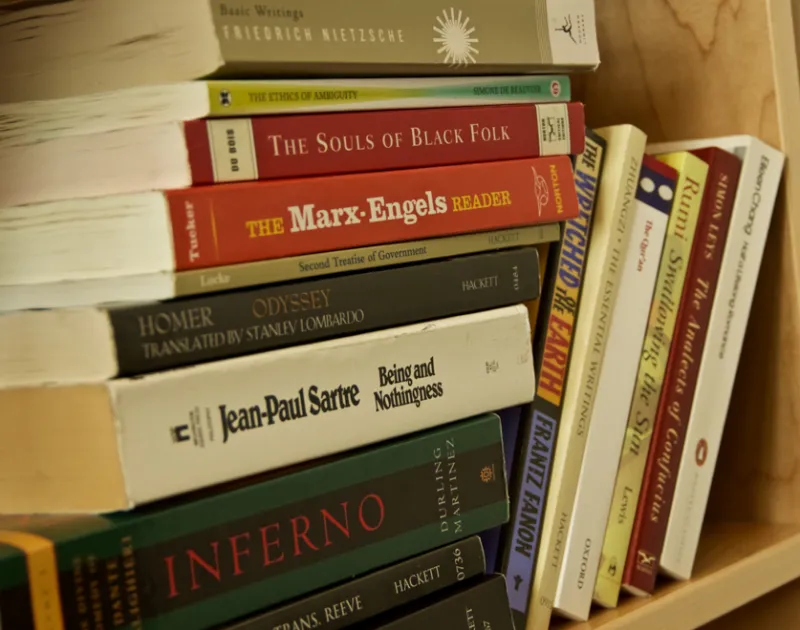While the hallways of the Cardenal dorm of Florence Moore Hall are often filled with laughter and hustles, they also often host hours-long deep intellectual conversations about — among other typical college quibbles — the nature of justice or the role of religion in everyday life. These exchanges that engage the classics, history and literature, are often initiated by frosh in Stanford’s Structured Liberal Education Program (SLE).
The vibrant community of SLE extends beyond just its conversational frosh. It includes dedicated section leaders, guest lecturers, program alums who continue to reside in the program’s dedicated dorms, community connections (who tutor students on essays) and residential tutors. So with SLE’s 50th anniversary approaching in 2024, I couldn’t help but wonder: what is SLE’s secret to maintaining a sustainable ecosystem? How are students and professors so dedicated to this enriching community, that they remain a part of it year after year?
Professor Marisa Galvez, the director of SLE, credits SLE’s integrated, all-in-one environment with the program’s continued success. SLE “was always part of a residential program — a college in a university — where everything is fluid,” Galvez said. The fact that SLE students have easy access to their professors and each other, Galvez said, helps facilitate students’ conversations with professors before and after the lecture as well as with SLE residential tutors and community connections in and out of FloMo. Galvez added that FloMo’s design, which houses students’ rooms, classrooms and dining hall all in one building, helps maintain the vibrant and integrated environment of SLE.
Mary Markley ’23, a SLE alum and my SLE community connection who helps tutor SLE students like me, echoed the sense of unity that SLE provides. During admit weekend, Markley recalled that she was impressed by the program’s camaraderie and SLE students’ authentic connection with each other “on an intellectual and on a social level.”
“SLE was one of the reasons why I ended up choosing Stanford,” Markley said. The “genuine bonds and friendships” she formed at SLE motivated her to stay connected after her freshman year through opera trips, speaker events and the community connection opportunity.
SLE’s focus on intellectual vitality is also a source of attraction for the guest speakers who devote their time to delivering lectures to SLE students. Classics professor Richard Martin has been a guest lecturer for SLE classes for the past 18 years, regularly teaching about Homer’s Odyssey. Professor Martin remarked that students are “full of eagerness” and added that he has been consistently impressed by the questions that they ask.
Martin believes that the intellectual vitality of SLE students comes from the community’s “protective cocoon.” In this environment, for Martin, SLE students are “unspoiled” as they think “it’s okay to talk about the Odyssey with their friends without worrying about facing criticism for being pretentious.” As an SLE student myself, I can testify to the quirkiness and nerdiness of SLE students and, as Professor Martin remarked, we are proud of who we are.
Moreover, Professor Galvez recalled her experience starting as a guest lecturer, when she was impressed by the fact that SLE students “not only do the readings but [they] also engage and ask great questions.”
“I don’t think I’ve ever had such a great discussion with students during and after a lecture,” Galvez added.
Faculty members also said that they stay involved with SLE in the hopes of getting to know students outside of the classroom. Galvez said that she truly enjoys her conversations with SLE students and alumni, adding that, through these conversations, she can always recognize the inner drive within SLE students that fuels their focus and engagement.
Jeremy Sabol, a SLE lecturer since 2003 and the Associate Director of SLE, said that he is dedicated to advocating for a vision of Stanford that exists “in the hallways of FloMo, and in the dining hall,” where spontaneous intellectual discussions happen. Sabol believes that he and other section leaders are all making a case for this “quieter voice in the chorus of different Stanfords.”
While Stanford can seem like a chorus of Silicon Valley tech buzz, I believe that SLE students create a quieter humanist voice that is enriching for themselves and their community; and the freedom to shape a unique experience for students is a defining experience for Stanford frosh.
